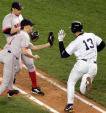
It didn't take long for an "unemployed" Theo Epstein to attract interest on the job market. As we
discussed on Monday, Epstein essentially quit as Red Sox general manager this week, after declining a 3-year contract extension worth $1.5 million a year. According to the
Boston Herald, the Costa Rican-based
Nine Online Sports Betting has offered Epstein a position that would pay him $2 million a year. (Scott Van Vorhis, "Gambling Site Makes Offer to Theo," Boston Herald,
Nov. 3, 2005). In the position, Epstein would set odds for Major League games.
But the package includes more than mere mucho dinero. Indeed, Epstein would receive rather plush housing accommodations: a 6,000-square foot mansion in the mountains of Costa Rica, along with a "small army of maids and other help," as well as an assortment of on-site athletic facilities, including a soccer field and a tennis court.
At least based on the compensation, it seems hard to imagine a better setting for a single, 31-year old guy like Epstein--particularly given his recent high-stress, all-consuming, yet incredibly successful tenure as Red Sox GM. He really could walk away into the sunset, head held-high, having accomplished more than most will in their entire lives.
But is this merely a publicity stunt for Nine Online? Probably, particularly given that 1) Epstein has already been in contact with another MLB team about becoming its general manager (and if I were a gambler, I'd put my money on him becoming GM of the Washington Nationals by the end of next week) and 2) Epstein has expressed interest in eventually pursuing politics, and I think it is safe to assume that being a gambling jefé in Costa Rica probably wouldn't be great resume fodder for an aspiring U.S. Senator.
But who knows. $2 million a year + king-like treatment + a tropical paradise all to merely set odds for baseball games? That doesn't sound like such a bad gig, does it?
Update: Wes raises a great question in the comments:
This is an interesting proposition to say the least. However, given the stance MLB takes toward gambling, legal or otherwise, I find it hard to believe that he would be allowed to actaully set odds for an offshore gambling site for two years and then return to MLB in any capacity, especially as the general manager of a team. I wonder, if Epstein were to take this job, and then attempt a comeback to MLB in the future, would his return be met with heavy opposition from the powers that be? Wouldn't it be somewhat hypocritical to ban from the game those who place bets on the lines, and then allow participation by those who actually set them?
Terrific point. So maybe this isn't such a great opportunity for Epstein, unless he wants to walk away from the game for good. I know Larry Lucchino was tough to work for, but was he
that tough?
 I have been meaning to post this for some time: as many of you know, I teach at Mississippi College School of Law in Jackson. We have a brand new website. I hope you take a look, and learn more about our school, which also recently opened a dynamic, start-of-the art facility (with high-tech classrooms and an extraordinarily-nice student center -- it is really first class). We'll be celebrating our new campus with a ribbon cutting and building dedication on Thursday, December 1. Excellent times here in Jackson.
I have been meaning to post this for some time: as many of you know, I teach at Mississippi College School of Law in Jackson. We have a brand new website. I hope you take a look, and learn more about our school, which also recently opened a dynamic, start-of-the art facility (with high-tech classrooms and an extraordinarily-nice student center -- it is really first class). We'll be celebrating our new campus with a ribbon cutting and building dedication on Thursday, December 1. Excellent times here in Jackson.





